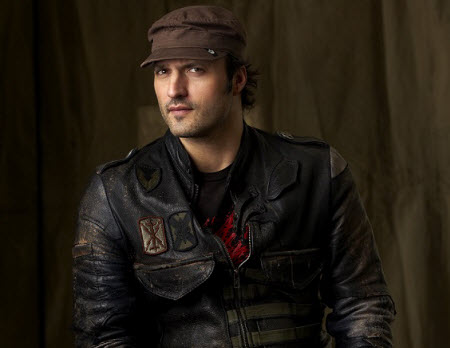El Rey’s Rodriguez Leads Rapid Rise
The smarter way to stay on top of the multichannel video marketplace. Sign up below.
You are now subscribed
Your newsletter sign-up was successful

Nearly two years after launch, El Rey Network is making a name for itself on the cable network landscape. The network — born in 2013 as one of four new minority-owned networks supported by Comcast under the Federal Communications Commission’s conditions for its 2010 acquisition of NBCUniversal — gained about 12 million subscribers year-to-year to hit the 36 millionsubscriber mark in August, the biggest such gain of any national service tracked by Nielsen.
El Rey can point to quality original series, including horror-themed From Dusk Till Dawn: The Series; Latino pro wrestling series Lucha Undergound; and acquisitions of mainstream fare Constantine, Almost Human, The Twilight Zone and Freddy’s Nightmares via a pact with Warner Bros. Domestic Television Distribution .
The architect of El Rey’s success is filmmaker and network chairman Robert Rodriguez . Rodriguez spoke with Multichannel News programming editor R. Thomas Umstead about the network’s evolution and programming strategy, and about the Hispanic television marketplace.
Multichannel News:Two years after El Rey’s launch, is the network where you want it to be?
Robert Rodriguez: It’s been terrific. We’ve really expanded our distribution — we’re in more homes than ever and we’ve had the opportunity to play with our programming. Every time you move one thing it creates a different result, and it’s very exciting. We have a lot of originals — it’s rare for a new network to have this much original programming right out of the gate, so we’re really proud of that. For me, it was fascinating to figure out how a network works compared to a movie. With a movie I know that if I write a script, we go shoot it and it gets released. Now we can see with the network that if we make these kinds of moves it pays off in a certain amount of time. We can keep being bold and experiment because we can adjust very quickly, unlike a movie where once it’s released, that’s it. The network is a constantly evolving beast.
MCN:When the network was first launched it was focused on reaching English-language Hispanic viewers. Two years in, how would you define the network now?
RR: It’s a visceral content network. We’ve been trying to reach men 18-49. There aren’t a lot of options for men, so we wanted to create a network that appealed to that group, as well as to kick-ass females — we have bad-ass females in most of our shows that draw a lot of female fans — but the focus was to create a real visceral, action-adventure network. We’ve kept with that and expanded what our reach is, and we’re very happy with it.
The smarter way to stay on top of the multichannel video marketplace. Sign up below.
MCN:You’ve brought some of your signature movie franchises, such asDusk Till Dawn, to the network but you’ve also brought some Hispanic -themed content, includingLucha Undergound, which you produced with Mark Burnett. Were you surprised at the success of the wrestling series?
RR: It’s kind of what we had hoped, but you’re always surprised when it works this well. It felt so fresh, so new and so different that we were hoping people would catch on. This has never been seen before — there are so many things in Latin culture that have never been shown on television. It’s kind of why we’re doing the network — if people had a chance to see our programming done in the right way, they would get turned onto it and love it. [Hispanic-themed content] is popular for a reason in other countries, but I don’t think it’s been translated correctly here.
MCN:You’re now in the second season ofFrom Dusk Till Dawn. How has it evolved from a movie into a television series?
RR: The first season was about retelling the movie in a new way because I wanted to use Quentin [Tarantino’s] characters but I couldn’t do a direct sequel because a lot of the characters died [laughs]. I had to retell it and have different things happen to people. In season two it’s a completely different story … you feel like you’re seeing a sequel to From Dusk Till Dawn because all of the characters are doing completely different things. It’s really interesting and suspenseful, and the season is great.
MCN:You mentioned Latin culture-themed content on television. Are we seeing more of that type of content on television today or is the industry still not doing enough to provide such images to a growing multicultural audience base?
RR: I haven’t paid a lot of attention to other networks. I thought there was more, but I saw numbers recently that there really wasn’t more and a lot lower than I thought. [Latino] representation in front of and behind the camera on other networks in primetime is like 2% to 3% when the country is 17% Hispanic. But on our network it’s crazy … our network is 60% to 70% [Hispanic ] — it can be done if that’s your focus, so there’s really no excuse. It can always be better.
R. Thomas Umstead serves as senior content producer, programming for Multichannel News, Broadcasting + Cable and Next TV. During his more than 30-year career as a print and online journalist, Umstead has written articles on a variety of subjects ranging from TV technology, marketing and sports production to content distribution and development. He has provided expert commentary on television issues and trends for such TV, print, radio and streaming outlets as Fox News, CNBC, the Today show, USA Today, The New York Times and National Public Radio. Umstead has also filmed, produced and edited more than 100 original video interviews, profiles and news reports featuring key cable television executives as well as entertainers and celebrity personalities.

